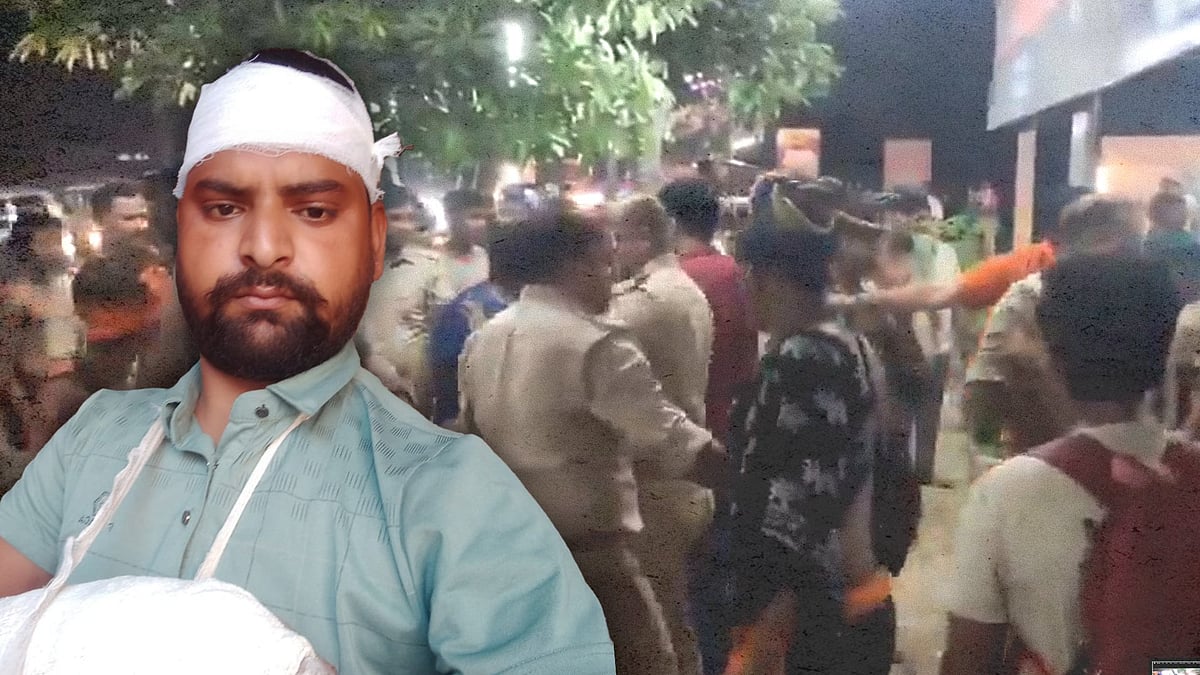In Delhi, Muslim drivers ‘hide identity’, avoid kanwar yatra route ‘fearing targeted violence’
The national secretary of a transport union also urged drivers to remove religious markers from cars, citing ‘threat’.
“Mahaul theek nahi hai. Hifazat kare…Jo bhi community stickers laga rahe hai apne mazhab ke, usse bhi kahin na kahin problem ho raha hain. Hum threat mein hain (The environment is not good. Be careful…whoever is putting religious stickers, that too is creating a problem somewhere. We are under threat).”
This unusual caution to “remove religious markers from cars”, citing “threat”, was sent on the WhatsApp groups of the Indian Federation of App Based Transport Workers on July 27, purportedly directed towards non-Hindu drivers of Delhi, Uttar Pradesh, and Haryana in the wake of the spate of violence along the kanwar yatra route.
The voice note by Shaikh Salaudin, the union’s national secretary, did not mention the kanwar yatra. But it came after a heated discussion over violence against a Muslim driver along the route of the yatra, which had begun just five days earlier. Salaudin told Newslaundry, the union has asked drivers to “remove markers of their religion, like stickers or hanging accessories”, and has also been “telling them what to do when someone attacks them”.
IFAT has a network of several taxi drivers’ associations and over 75,000 gig workers across the country, including those working for Ola, Uber, Rapido, Swiggy, and Zomato. Newslaundry found 32 such Muslim drivers in Delhi who are reportedly either “hiding their religious identity” or not taking up journeys along the kanwar yatra route.
Muslim driver attacked ‘over kalma’, govt ‘legitimised bias’
The voice note by Hyderabad-based Salaudin came following an attack on a Muslim driver on the Lucknow-Gurugram highway around 4:30 am on July 27, after the kanwariya stopped and attacked him allegedly over “a kalma or Islamic phrase written in Urdu on the windscreen of the car”.
The driver in his mid-40s, who requested anonymity, told Newslaundry that kanwariyas questioned his and his passengers’ religion. He said they struck him on the shoulder and shouted at his Hindu passengers for riding with a Muslim driver. The kanwariyas let them go after the passengers promised that they would never again book a ride with a Muslim driver. The driver said no FIR was lodged in the matter because “I was scared and did not have the time to take it further”.
Salaudin told Newslaundry that “the important thing is that this incident happened because they were able to identify his religion from afar. That’s why we have been telling our drivers to hide their identity and save themselves from any such incidents. They will need to understand that today’s environment does not allow them to express their religion”.
He said that Muslim drivers “feel even more threatened this year because the UP government has legitimised discrimination based on religion by passing such orders. And till the time, the drivers won’t feel safe. How can they be expected to do business?”
The IFAT official was referring to the UP government’s order to eateries and food stalls along the kanwar yatra route to display the names of their owners and employees to prevent “confusion” among devotees. Similar directives have been passed by the Madhya Pradesh and Uttarakhand governments, while the Supreme Court has put a stay on them, saying eateries cannot be forced to do so.
Salaudin said: “We have asked drivers to remove markers of their religion, like stickers or hanging accessories. We have advised this to the drivers of all the communities to be neutral. We have also been telling them what to do if anyone comes to attack them, like to stay calm, roll up the glass of their cars, dial the police, and send their location in the WhatsApp groups for us to be able to help them immediately.”
A spate of violence has marked the kanwar yatra that began on July 22 and concluded on August 2, with kanwariyas expected to return to their homes by August 5 from prominent destinations including Haridwar, Gaumukh, Gangotri, Sultanganj, and Deoghar.
On July 26, a Muslim family was targeted by the kanwariyas for allegedly “breaking a kanwar” on the Delhi-Meerut Expressway, where their car was stopped and vandalised. Several Hindus have also not been spared from the violence of the kanwariyas. A Dalit e-rickshaw driver from Muzaffarnagar died days after being severely assaulted by the kanwariyas on July 23 for allegedly “breaking a kanwar”.
Sikh drivers associated with Punjab Taxi Driver Association told Newslaundry that they too are avoiding the kanwar yatra routes for two weeks over the fear of being attacked and the traffic. Jasminder Sandhu, owner of Outstation Cab service based out of Kashmere Gate, said “with the heavy traffic, the fuel expenditure increases”. But he added that “Muslim drivers feel more threatened.”
‘Using removable name plate, loss of money better than loss of life’
In the wake of the incidents of violence, Muslim drivers from across Delhi told Newslaundry that they “felt more susceptible” and had only two options – to hide their identity or incur losses by halting their business for two weeks of the kanwar yatra.
Mohamad Waseem, 42, owner of Saba Travels in Delhi’s Okhla, said that “to protect themselves, Muslim drivers had resorted to hiding their religious identities last year as well, after the communal violence in Nuh”. His travel agency employs two Muslim drivers.
Waseem, who is also the Okhla president of the IFAT-affiliated Sarvodaya Drivers Association of Delhi, added that this year, “it is even more dangerous because of partisan orders passed by the government. Those orders have deeply hurt us.”
About 50 taxi drivers in Okhla are part of the Sarvodaya Drivers Association, of which 20 are Muslims. Waseem said that “at least 10 of these Muslim drivers have removed religious markers from their cars to be able to drive safely. But all of us have opted for a removable name plate on our cars.”
As per government rules, commercial vehicles are needed to display the name and contact of the vehicle owner. Waseem said, “All Muslim commercial drivers in my area have opted for removable magnetic name plates. So we can remove them anytime we feel unsafe or uncomfortable. This is all we can do. We can not ask the drivers to shave off their beards or remove their caps to be able to work.”
Besides hiding identities, several Muslim travel agency owners in Delhi said that they did not take rides for two weeks of the kanwar yatra.
Waseem said, “To ensure that we do not bump into kanwariyas, we did not take rides for Mathura, Muzaffarnagar, or Bareilly for two weeks. That’s why our business has dropped to only 10 percent of what it usually is. Earlier, from one taxi, we could easily earn a profit of Rs 18,000 a week. But during the two weeks, we made only Rs 2,000 per week.”
Nazim Khan, owner of Manzil Taxi Service in Okhla, told Newslaundry that he employs 25 drivers, of which 20 are Muslim and they have all taken off for two weeks. He claimed that as he cancelled several trips along the kanwar yatra route, his business suffered a loss of about Rs 2.5 lakh. “Nobody wants to risk their life.”
Khan further said that “forget about going to Uttarakhand or UP, these drivers did not even want to take rides in Delhi because kanwariyas are everywhere. Last week, the only rides I took were to the airport or railway station. This week, I did not take that as well. Till last year, we used to only avoid it but this time we forbade them. Because loss of money is better than loss of life.”
He said Muslim drivers who have EMIs to pay are the only ones who are taking rides during these two weeks. “They are doing this by hiding their identities.”
‘Islamophobia seeping in among drivers, passengers’
“It is unprecedented,” said Mohammad Harun, owner of Golden Triangle Tour Service, which employs five drivers.
Harun told Newslaundry that there was a time “when Muslims and Hindus celebrated Diwali and Eid together. But now these dynamics have completely changed over the last decade. At least, until last year, we used to accept rides in Delhi during the kanwar yatra. But this year, we have not done that either. We will resume our work from Tuesday, once all kanwariyas return to their hometowns.”
At least five tour and travel owners, who did not want to be identified, said that there is “a growing trend of non-Muslim passengers saying no to Muslim drivers”.
Nazim Khan of Manzil Taxi Service said, “Whenever I get a request to provide a taxi to Hindu religious sites like Khatu Shyam temple in Rajasthan or Kedarnath Yatra, the first thing customers ask is the religion of the driver. And when I tell them, a Muslim driver is available, they immediately say no.”
Salaudin said that people need to “learn to treat workers better” but the app-based companies also need to “provide more protection to their drivers”. “A driver drops their passenger safely despite their religion. Because it is our duty. They also need to behave the same way with the drivers. Moreover, these apps also need to provide more protection to their drivers. Like they should declare openly that they will not tolerate any discrimination based on religion. Like how they mention discounts and offers. And they should take serious action against anyone who violates these guidelines.”
In times of misinformation, you need news you can trust. We’ve got you covered. Subscribe to Newslaundry and power our work.
 ‘We pleaded but they kept assaulting’: The full story of attacks during Kanwar Yatra in UP
‘We pleaded but they kept assaulting’: The full story of attacks during Kanwar Yatra in UP ‘Impact on business, motive clear’: Muslim vendors on Kanwar Yatra diktat
‘Impact on business, motive clear’: Muslim vendors on Kanwar Yatra diktat 